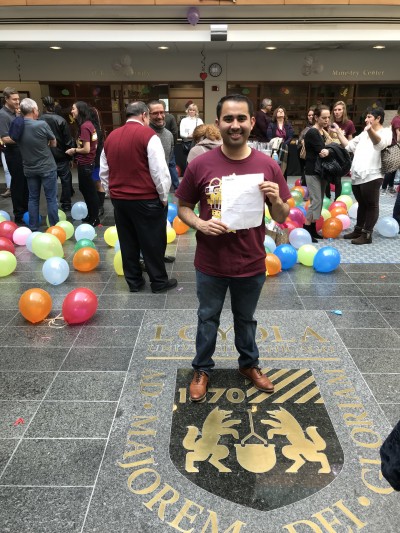
Ever Arias celebrates after knowing that his medical residency will be in Southern California, where he was raised. Arias was brought to the country when he was 6 years old. Photo: Courtesy of Ever Arias.
For 26-year-old Paulina Ruiz, having legal immigration status is about more than going to school or holding a job. It’s about staying healthy.
The University of California-Los Angeles graduate, whose parents brought her from Mexico to the U.S. illegally two decades ago, has cerebral palsy, a neurological condition diagnosed shortly after birth.
In the past, Ruiz said, she relied on emergency rooms for her health care and rarely could see specialists. She developed kidney and back problems after years of inconsistent medical care and using an inappropriate wheelchair.
Paulina Ruiz, who has cerebral palsy, said losing her legal immigration status could mean losing her health coverage and access to doctors. Ruiz is on Medi-Cal, which helps cover some of the costs of her medical care. (Courtesy of Paulina Ruiz)
But in 2012, she qualified for the federal Deferred Action for Childhood Arrivals (DACA) program, which temporarily protected her from deportation. In California, that meant she could get Medi-Cal, California’s version of the Medicaid insurance program for low-income Americans, and regularly see a doctor.
The Trump administration’s controversial decision on Tuesday to scrap the DACA program does more than put nearly 800,000 “Dreamers” in fear of deportation and losing their jobs. It threatens the health care of thousands of young adults like Ruiz, who either have job-based insurance or whose incomes qualify them for Medicaid in California and several other states.
“I am very upset,” said Ruiz, who organizes for the Coalition for Humane Immigrant Rights of Los Angeles and lives near the city. “I don’t know what’s going to happen to my health.”
The decision is set to take effect in six months, unless Congress comes up with an alternative plan. Trump has said the program, started under President Obama in 2012, rewards lawbreakers who hurt Americans by taking their jobs and depressing wages, a claim some economists dispute. Attorney General Jeff Sessions said Tuesday that the program was unconstitutional because it was a unilateral executive action on a proposal that had been repeatedly rejected by Congress.
Use Our Content
This story can be republished for free (details).
Trump, who has suggested he has conflicting sentiments about the program, left open the door for Congress to change it. “I have a love for these people, and hopefully now Congress will be able to help them and do it properly,” he said, according to The New York Times. But the newspaper noted that he did not call for bipartisan legislation to restore its protections.
The program allows immigrants ages 16-31 who were brought to the United States illegally as children to receive work permits and temporary protection from deportation. Those who qualified were explicitly barred from receiving federal health benefits through Medicaid, Obamacare exchanges or other programs.
Many DACA recipients now have jobs with health insurance. In addition, California, New York, Massachusetts, Minnesota and the District of Columbia have used their own money to cover low-income Dreamers through Medicaid, according to Tanya Broder, a Berkeley, Calif.-based senior staff attorney for the National Immigration Law Center.

Maria Garcia, 22, said she was able to get a job as a receptionist at a Los Angeles hotel because of the DACA program. The job also came with health insurance, which helped cover physical therapy from a knee injury. She fears getting fired and being unable to pay for her own health insurance and medical care. (Anna Gorman/California Healthline)
Maria Garcia, 22, said she was able to get a job as a receptionist at a Los Angeles hotel because of the DACA program. The job also came with health insurance, which helped cover physical therapy from a knee injury. She fears getting fired and being unable to pay for her own health insurance and medical care. (Anna Gorman/California Healthline)
There are an estimated 220,000 DACA recipients in California, a larger pool than in any other state. Those who meet income requirements — 138 percent of the federal poverty level or $33,534 for a family of four — can qualify for coverage under the state’s “Permanently Residing in the United States under Color of Law” eligibility category.
That coverage is now in question. In California, those at risk of losing Medicaid are 19 and older, because the state under a separate law decided to cover all low-income children, regardless of immigration status, through age 18. That decision was not connected to the DACA program.
With the federal government’s action, “nobody will lose coverage in the Medi-Cal program immediately,” said Ronald Coleman, director of government affairs for the California Immigrant Policy Center, an immigrant advocacy group. But Coleman worries about what happens after March 5, when DACA’s protections will end — unless Congress takes action to protect the program.
The Department of Health Care Services, which oversees Medi-Cal, could not provide a comment Tuesday, a spokeswoman said.
Marielena Hincapié, executive director of the National Immigration Law Center, told reporters in a conference call Tuesday that she expects DACA recipients to start losing their job-based health insurance. Hincapié said she is particularly concerned about the effect of the president’s decision on the mental health of DACA recipients.
“The need for mental health services will only be greater,” she said.













